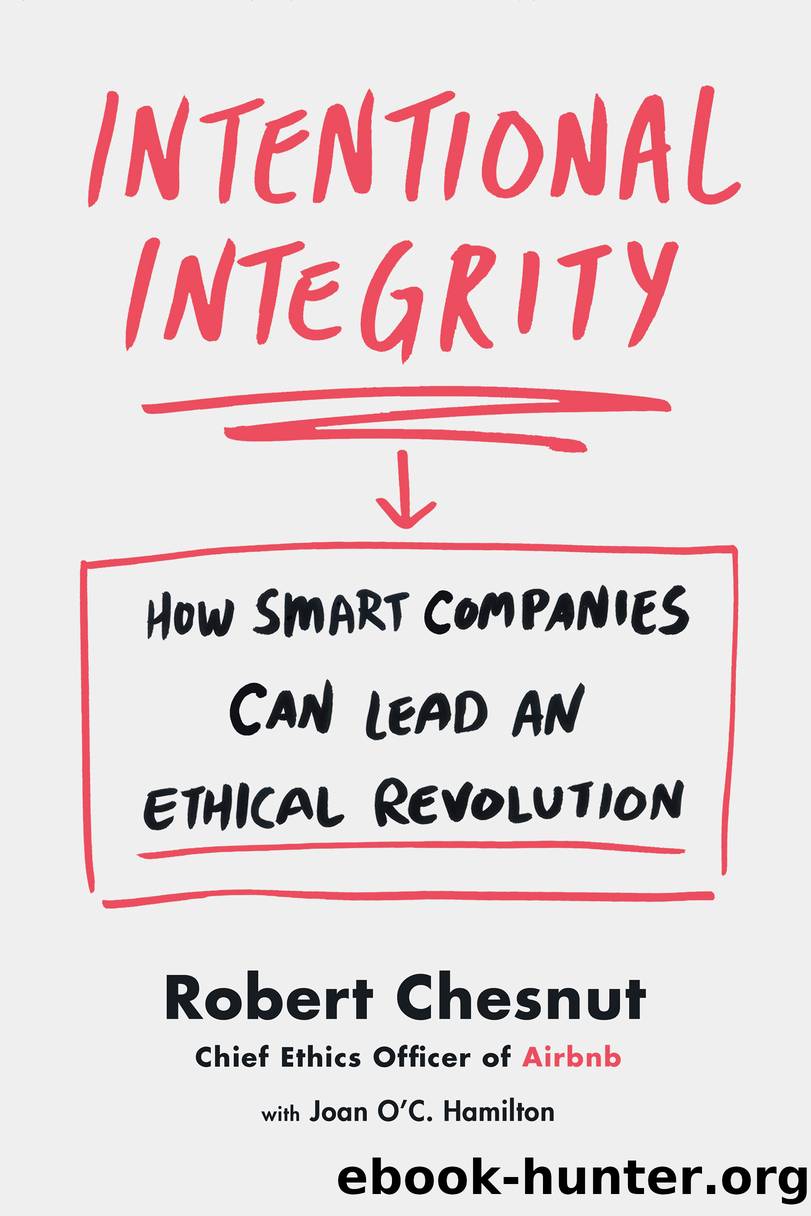Intentional Integrity by Robert Chesnut

Author:Robert Chesnut
Language: eng
Format: epub
Publisher: St. Martin's Publishing Group
Ok, but what about …
The violations involved in the examples featuring Milo and Joe are fairly straightforward. Now I want to tackle two difficult issues where multiple corporate priorities conflict when you’re trying to deal with a violation of the code of ethics. These kinds of cases can really test a company’s commitment to integrity—and we’ve seen many, many companies fail that test.
I mentioned in chapter 3 that no company should have a provision in its code of ethics that it’s not prepared to enforce against its most valuable employee. This idea must be incorporated into your value-setting exercise, and it applies to both the actual rule you write and your plan to react if the rule is broken. In that same chapter I talked about the “golden” employee phenomenon—the employee whom a senior leader likes and tends to shield from criticism or even consequences for violating a rule. One of the most difficult integrity dilemmas for a company is when that person exploits their status in full view of others. They essentially dare their manager or other leaders to look the other way and ignore bad behavior or acts that violate the code of ethics.
Let’s explore this with the fictional outfit ThriftyCo. In its early, scrappy days, the company saved money by insisting that all employees, including the CEO, must fly coach for domestic travel. It’s ten years later, and ThriftyCo is now global with over 2,000 employees. One of those employees is a sales executive named Jane, who generates the most sales revenue of anyone in the company. Jane regularly flies around both the country and the world, running from airports to sales presentations and back to airports. Jane has multicity serial trips, sometimes a mix of international and domestic flights, and she values the ability to catch up on sleep when she can so she is rested for meetings that occur shortly after landing. And by the way, Jane is five feet, eleven inches tall. Coach seating is literally painful for her, and after a year on the job, she began ignoring the rule. She books exclusively business-class seats at the company’s expense, and her manager ignores it. Jane, after all, is a superstar.
However, another sales rep complains. The manager calls in Jane and says, “Jane, the time has come. I’ve looked the other way but now we’ve had a formal complaint. You have to go back to coach or pay for your own upgrades.” Jane can’t believe he’s hassling her about this. She responds: “Well, our competitor’s sales team flies business class. Maybe I should go work for them.”
What’s weighing on Jane’s manager is that the CEO often tells reporters and Wall Street about how all ThriftyCo employees still fly coach. Because of that, the rep’s actions technically undermine the brand. But he should have surfaced this issue, not just ignored it.
In theory, holding the line and insisting Jane fly coach might seem like the high road now. But it’s also a dumb hill to die on.
Download
This site does not store any files on its server. We only index and link to content provided by other sites. Please contact the content providers to delete copyright contents if any and email us, we'll remove relevant links or contents immediately.
Hit Refresh by Satya Nadella(8338)
The Compound Effect by Darren Hardy(7559)
Change Your Questions, Change Your Life by Marilee Adams(6641)
Nudge - Improving Decisions about Health, Wealth, and Happiness by Thaler Sunstein(6633)
The Black Swan by Nassim Nicholas Taleb(6190)
Daring Greatly by Brene Brown(5640)
Deep Work by Cal Newport(5463)
Principles: Life and Work by Ray Dalio(5322)
Rich Dad Poor Dad by Robert T. Kiyosaki(5149)
The Myth of the Strong Leader by Archie Brown(4789)
Man-made Catastrophes and Risk Information Concealment by Dmitry Chernov & Didier Sornette(4735)
Big Magic: Creative Living Beyond Fear by Elizabeth Gilbert(4723)
The Slight Edge by Jeff Olson(4722)
Discipline Equals Freedom by Jocko Willink(4635)
Digital Minimalism by Cal Newport;(4540)
The Motivation Myth by Jeff Haden(4524)
Stone's Rules by Roger Stone(4415)
Management Strategies for the Cloud Revolution: How Cloud Computing Is Transforming Business and Why You Can't Afford to Be Left Behind by Charles Babcock(4130)
The Doodle Revolution by Sunni Brown(4043)
